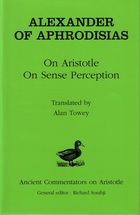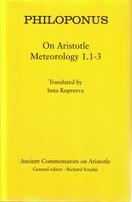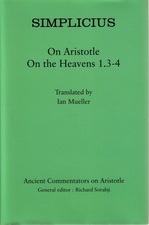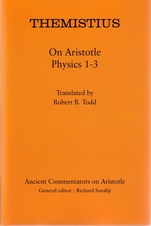The Aristotelian Commentators
For information about the ancient commentators on Aristotle a good place to start online is with the helpful entries in the Stanford Encyclopedia of Philosophy, and of those the best place to begin is the entry on 'Commentators on Aristotle' by Andrea Falcon. Below are some shorter introductions and bibliographical pointers.
Alexander of Aphrodisias

Aristotle’s leading defender, flourished around 205 CE, and was recently confirmed by inscription to have been head of the Aristotelian school in Athens. Much commentary by him has recently been discovered in Greek and Arabic. His main rivals were the Stoics. Against their belief in determinism, or inevitability, he argued that the same circumstances need not have the same outcome. Against their belief in the exact repetition of history, he insisted that the same individuals could not recur after an interruption, although he allowed that what preserves an organism’s identity is not matter but form, envisaged – so Aristotle – as an elastic tube that preserves structure while matter flows through it in changing quantities. Forms were individual, and being universal was downgraded to a merely accidental attribute, dependent on the mind, of likeness between at least two individuals. Alexander rejected the Stoic idea that ‘Socrates is wise’ implies Socrates’ existence with analyses of ‘Socrates is dead’ that rival the 20th century discussions of Bertrand Russell. When he could not defeat Stoic ideas, he appropriated them for Aristotle, as e.g. their idea of the mind’s assent, Stoic forerunner of Christian consent of the will, as distinguishing belief from mere appearance.
Further Resources:
Further Resources:
- D. Frede, 'Alexander of Aphrodisias' (Stanford Encyclopedia of Philosophy)
- P. Adamson, 'Not Written in Stone: Alexander of Aphrodisias' (Podcast from History of Philosophy Without Any Gaps)
- R. W. Sharples, ‘Alexander of Aphrodisias: Scholasticism and Innovation’, ANRW II 36.2 (1987), 1176-1243
- P. Moraux, Der Aristotelismus bei den Griechen: III. Alexander von Aphrodisias (Berlin: de Gruyter, 2001)
Ammonius
Proclus’ ablest pupil, Ammonius (435/45 – 517/26) became head of the pagan Neoplatonist school in Christian Alexandria, and secured the school’s future after Christian-led riots in 486, perhaps with an agreement not to emphasise pagan priestly powers. At any rate, that is the one topic on which he omits to follow Proclus’ discussion of Plato on names. He claimed, again diverging from Proclus and restoring the harmony of Plato and Aristotle, that Aristotle intended Plato’s view that God is needed as Creator to produce beginningless existence. His wide interests included astronomy and he provided new discussions of determinism. He taught the leading philosophers of the sixth century, Simplicius, Philoponus another commentator and two successors in his chair.
Further Reading:
Further Reading:
- D. Blank, 'Ammonius' (Stanford Encyclopedia of Philosophy)
- D. Blank, 'Ammonius Hermeiou and his School', in The Cambridge History of Philosophy in Late Antiquity, edited by Lloyd P. Gerson (Cambridge: Cambridge University Press, 2010), vol. 2, 654–666.
Aspasius
Aristotelian in Athens, wrote the earliest extant commentary on Aristotle’s ethics around 131 CE.
Further Reading:
Further Reading:
- A. Alberti, R. W. Sharples, eds, Aspasius: The Earliest Extant Commentary on Aristotle’s Ethics (Berlin: de Gruyter, 1999)
Boethius
Appointed to court by the Ostrogothic king Theodoric at Ravenna in Italy, Boethius (480? – 525?) is the commentator most famous in the West. He planned to write commentaries in Latin, but in the Greek style on all of Plato and Aristotle. He had covered only some of Aristotle’s logic, and Porphyry’s introduction to that logic, when he was imprisoned and executed by Theodoric in his forties on dubious charges. But he did succeed in giving the early middle ages in the Latin West knowledge of what little of Aristotle he had covered. Still better known was his prose and verse work, The Consolation of Philosophy, written in prison, which included the question whether life was governed by chance, necessity or divine providence. It was later paraphrased or translated by the English sovereigns Alfred and Elizabeth I and by Chaucer.
Further Reading:
Further Reading:
- J. Marenbon, 'Boethius' (Stanford Encyclopedia of Philosophy)
- J. Marenbon, Boethius (New York: Oxford University Press, 2003)
- S. Ebbesen, 'The Aristotelian Commentator', in The Cambridge Companion to Boethius, edited by John Marenbon (Cambridge: Cambridge University Press, 2009), 34-55.
Dexippus
Dexippus, the fourth century pupil of Iamblichus, retains traces of his teacher but may, in his one surviving commentary on Aristotle’s Categories, be closer to Porphyry and reflect some of Porphyry’s long-lost main commentary on that text, now tentatively identified.
Philoponus

John Philoponus (about 490 – the 570s) in Alexandria was born a Christian. Recent research on him has been surveyed up to 2010 in the second edition of Philoponus and the Rejection of Aristotelian Science, with two addenda in note 2 of the Introduction to the translation, Aeneas of Gaza ‘Theophrastus’ and Zacharias of Mytilene ‘Ammonius’, 2012. The second edition also interpreted the structure of the newly excavated lecture rooms of the Alexandrian School, and the implications for methods of teaching. Philoponus wrote most of his seven commentaries on Aristotle, largely following his pagan teacher Ammonius, before he delivered his dedicated attacks concerning the eternity of the world first against the pagan Proclus in 529 and next against Aristotle. In his commentary on Aristotle’s Categories (6.30-35), he says that the commentator should explain Aristotle’s meaning before expressing his personal opinion. Sometimes he saves his personal opinions for excurses or ‘corollaries’ within the commentary, or for separate treatises. But it seems to vary how far he keeps his own opinions out of the commentary proper. To some extent he sticks to expounding Aristotle in the commentary on Physics Book 4, chapters 1-5, but even here our translator comments that he sometimes presupposes his own rival views and refers to his having earlier put them forward in Ammonius’ classroom. In the commentary on Physics 4, 6-9, by contrast, he explicitly ridicules Aristotle’s dynamics and introduces his rival theory of impetus, applying it to the motion of projectiles and comets. He also denies Aristotle’s view that motion would be impossible in a vacuum. In the commentary on Physics Book 3, he argues that the pagans’ conception of infinity rules out their belief in an infinite past. His report of experiments refuting Aristotle by dropping weights of different magnitudes to compare their speeds of fall is confined to an excursus, but it may be referred to in the commentary on Book 3. In this bit of commentary he also introduces the most wonderful thought experiments, imagining the earth being moved or expanded, and denying the possibility of numbers lower than one as conflicting with Aristotle’s ban on a completed infinity.
Further Reading:
Further Reading:
- C. Wildberg, 'Philoponus' (Stanford Encyclopedia of Philosophy)
- K. Verrycken, 'John Philoponus', in The Cambridge History of Philosophy in Late Antiquity, edited by Lloyd P. Gerson (Cambridge: Cambridge University Press, 2010), vol. 2, 733-755.
- R. Sorabji, ed., Philoponus and the Rejection of Aristotelian Science (London: Duckworth, 1987); 2nd edn (London: Institute of Classical Studies, 2010)
Porphyry
Plotinus’ editor in Rome, Porphyry introduced the Neoplatonist tradition of commentary and ensured Aristotle’s place on the European curriculum by answering Plotinus’ criticism that Aristotle’s categories ignored Plato’s Forms. Aristotle, he said, was describing the perceptible world as a necessary preliminary to studying the Forms. His lost larger commentary on Aristotle’s Categories has just been tentatively identified and deciphered in part. He treated civic custom as inappropriate for philosophers in a beautiful book against sacrificing and eating animals, arguing that the nature of animals, gods and humans makes it inappropriate. He questioned also the beliefs of Christians in a book that was burnt – twice – and certain religious beliefs of his fellow Greek Platonists, with their enthusiasm for Egyptian religion. Why, he asked, did they allow erotic festivals to figure in religious worship.
Further Resources:
Further Resources:
- E. Emilsson, 'Porphyry' (Stanford Encyclopedia of Philosophy)
- P. Adamson, 'King of Animals: Porphyry' (Podcast from History of Philosophy Without Any Gaps)
Priscian
In 529, the Christian emperor in Constantinople, Justinian, stopped the teaching of the pagan Athenian school, and soon afterwards all seven of the Athenian philosophers took refuge for 18 months with the king of Persia, Khosroes I. The façade of their protector’s palace at Ctesiphon, south of the later city of Baghdad, still stands, as portrayed in the next section patrolled by a soldier in a modern version of inter-continental conflict. Priscian, one of the seven Athenian refugees, recorded the philosophers’ discussions with the king, starting with soul and body, but moving to subjects like the tides, that we should regard as scientific.
Further Reading:
Further Reading:
- F. A. J. de Haas, 'Priscian of Lydia and Pseudo-Simplicius on the Soul', in The Cambridge History of Philosophy in Late Antiquity, edited by Lloyd P. Gerson (Cambridge: Cambridge University Press, 2010), vol. 2, 756-763.
- M. Perkams, 'Priscian of Lydia, Commentator on the De Anima in the Tradition of Iamblichus', Mnemosyne 58 (2005), 510-530.
Proclus
Proclus (about 411 to 485), the next head of the Athenian school, continued Syrianus’ criticisms of Aristotle for disagreeing with Plato. Aristotle argued that God was needed only to inspire beginningless motion in the universe. He failed to realise that his argument implies Plato’s view that God is needed also as Creator to produce its beginningless existence. Proclus’ elaborate pagan theology was later plagiarized and applied to the Christian God. But he himself was hostile to, and for a time persecuted by, the Christians. In the absence of Neoplatonist commentary on Aristotle’s ethics, three of his ethical treatises have been translated, and a commentary on Plato’s theory of names that is closely followed by Ammonius writing on Aristotle.
Further Rescources:
Further Rescources:
- L. Siorvanes, Proclus: Neo-Platonic Philosophy and Science (New Haven: Yale University Press, 1996)
- Proclus Bibliography, at De Wulf–Mansion Centre, at KU Leuven
Simplicius

Simplicius (after 529) was another of the displaced seven Athenian philosophers, but they became disillusioned, and Khosroes then negotiated with Justinian their safe passage home. They are likely to have scattered, but it is controversial especially where Simplicius went. The commentaries do not seem to reflect in an obvious way continuing opportunities for teaching. He wrote the most extensive commentaries on Aristotle of all, one now occupying 1400 pages of print. He thus provides an immense panorama which records not only the numerous interpretations of, and attacks on, Aristotle, but earlier philosophy as well, and preserves many fragments of the 200 years of Presocratic philosophy that preceded Socrates and Plato. He also preserves many fragments of earlier commentators, especially of Iamblichus and Alexander, and the recent discovery of the original fragments of Alexander’s lost commentary on Aristotle’s Physics should facilitate decision on Simplicius accuracy and motives in his extensive citations. Despite the vehemence of his replies to the Christian Philoponus, he claims never to have come across him back in the city of his student days, Alexandria. It has recently been argued that Simplicius’ attack on Philoponus had a neglected influence on Arabic Philosophy.
Further Reading:
Further Reading:
- I. Hadot, ed., Simplicius, sa vie, son oeuvre, sa survie (Berlin: de Gruyter, 1987)
- H. Baltussen, Philosophy and Exegesis in Simplicius: The Methodology of a Commentator (London: Duckworth, 2008)
- C. Helmig, 'Simplicius', in E. N. Zalta, ed., The Stanford Encyclopedia of Philosophy (Summer 2020 Edition), https://plato.stanford.edu/archives/sum2020/entries/simplicius/
Syrianus
Syrianus (died about 437) taught in the re-established Athenian Neoplatonist school. Unlike the mainstream of Neoplatonism, he recognised Aristotle’s disagreements with Plato and criticised him. He objected, for example, to Aristotle’s view that one could learn about geometry by correcting for imperfections in physical shapes. Correction, he retorted, would require appeal to perfect Platonic concepts in the mind.
Further Reading:
Further Reading:
- A. Longo, 'Syrianus', in The Cambridge History of Philosophy in Late Antiquity, edited by Lloyd P. Gerson (Cambridge: Cambridge University Press, 2010), vol. 2, 616-629.
Themistius

Themistius (317-390?) in Constantinople, was an administrator for 6 emperors, and taught philosophy and rhetoric in his own school there around 345-355. He wrote sympathetic clarifications and reconstructions of Aristotle’s meaning and defended him from Galen. But he was independent of any one tradition, and he also invoked Platonic Forms, and disagreed with Aristotle, for example on the dependence of time on conscious beings, on the relation of productive intellect to self and on concept formation. Of the emperors he got on least well with his former pupil and fellow-pagan Julian, who somewhat rebuffed his rhetorical encomium. His commentaries did not display the religious zeal of Julian’s hero, Iamblichus – it was Julian who installed the mosaics in Iamblichus’ memory. Themistius’ commentaries may have been written for rhetoric students who needed only a smattering of pagan philosophy in order to shine in public life. Nonetheless, they included original and stimulating ideas in physics about space, time, motion, vacuum and change, and a later commentator, Philoponus, is said to have drawn on Themistius’ treatment of physics 600 times. Moreover, in his detailed philosophical reinterpretation of Aristotle’s Active Intellect, Thomas Aquinas was able to find in the 13th century evidence that Aristotle, contrary to appearances, believed in the immortality of individual human intellects. Themistius thus played an unintentional role in the later harmonization of Aristotle with Christianity. He is also known for his plea to the Emperor Jovian for tolerance for pagans, in which he appealed to human ignorance and concluded there is no one road leading to God.
Further Reading:
Further Reading:
- I. Kupreeva, 'Themistius', in The Cambridge History of Philosophy in Late Antiquity, edited by Lloyd P. Gerson (Cambridge: Cambridge University Press, 2010), vol. 2, 397-416.
